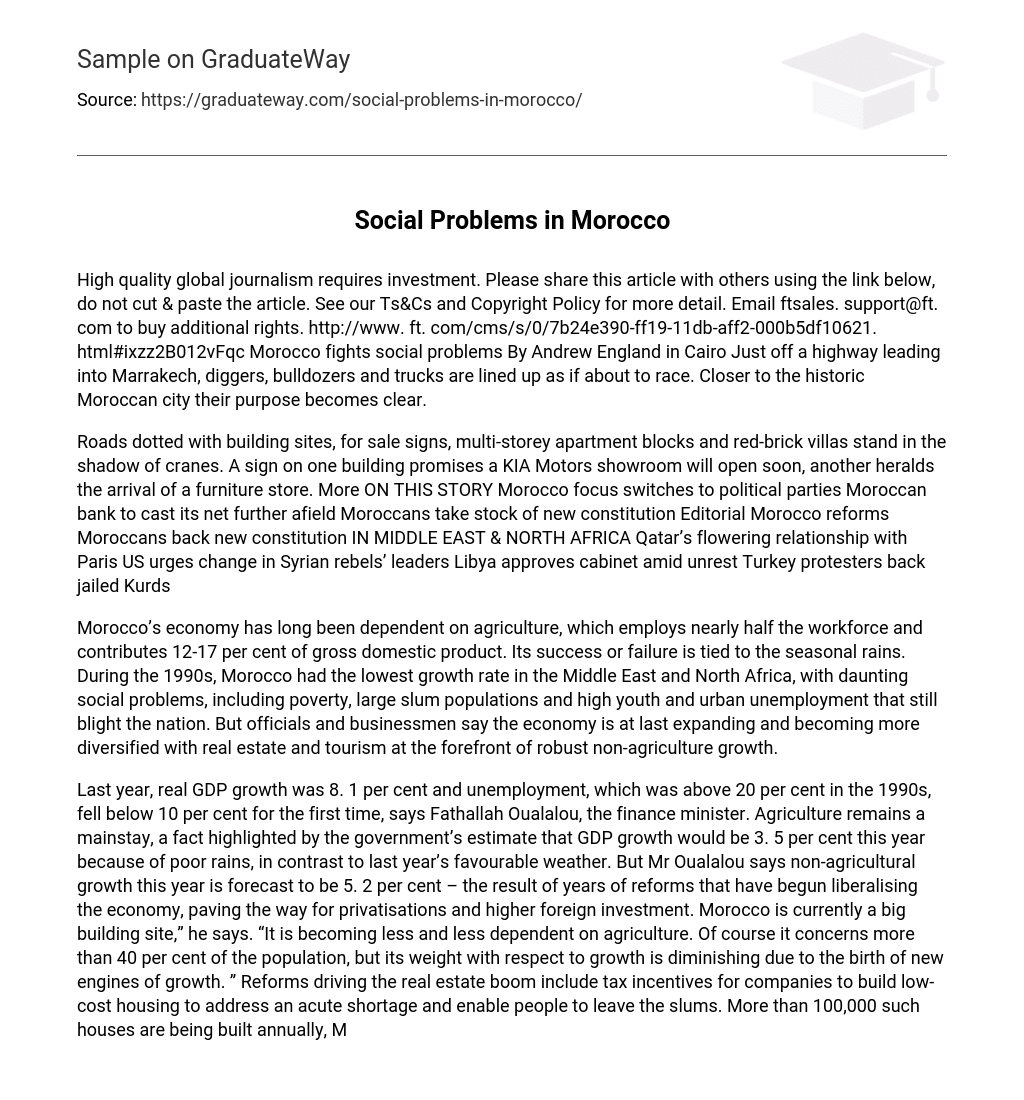High quality global journalism requires investment. Please share this article with others using the link below, do not cut & paste the article. See our Ts&Cs and Copyright Policy for more detail. Email ftsales. support@ft. com to buy additional rights. http://www. ft. com/cms/s/0/7b24e390-ff19-11db-aff2-000b5df10621. html#ixzz2B012vFqc Morocco fights social problems By Andrew England in Cairo Just off a highway leading into Marrakech, diggers, bulldozers and trucks are lined up as if about to race. Closer to the historic Moroccan city their purpose becomes clear.
Roads dotted with building sites, for sale signs, multi-storey apartment blocks and red-brick villas stand in the shadow of cranes. A sign on one building promises a KIA Motors showroom will open soon, another heralds the arrival of a furniture store. More ON THIS STORY Morocco focus switches to political parties Moroccan bank to cast its net further afield Moroccans take stock of new constitution Editorial Morocco reforms Moroccans back new constitution IN MIDDLE EAST & NORTH AFRICA Qatar’s flowering relationship with Paris US urges change in Syrian rebels’ leaders Libya approves cabinet amid unrest Turkey protesters back jailed Kurds
Morocco’s economy has long been dependent on agriculture, which employs nearly half the workforce and contributes 12-17 per cent of gross domestic product. Its success or failure is tied to the seasonal rains. During the 1990s, Morocco had the lowest growth rate in the Middle East and North Africa, with daunting social problems, including poverty, large slum populations and high youth and urban unemployment that still blight the nation. But officials and businessmen say the economy is at last expanding and becoming more diversified with real estate and tourism at the forefront of robust non-agriculture growth.
Last year, real GDP growth was 8. 1 per cent and unemployment, which was above 20 per cent in the 1990s, fell below 10 per cent for the first time, says Fathallah Oualalou, the finance minister. Agriculture remains a mainstay, a fact highlighted by the government’s estimate that GDP growth would be 3. 5 per cent this year because of poor rains, in contrast to last year’s favourable weather. But Mr Oualalou says non-agricultural growth this year is forecast to be 5. 2 per cent – the result of years of reforms that have begun liberalising the economy, paving the way for privatisations and higher foreign investment. Morocco is currently a big building site,” he says. “It is becoming less and less dependent on agriculture. Of course it concerns more than 40 per cent of the population, but its weight with respect to growth is diminishing due to the birth of new engines of growth. ” Reforms driving the real estate boom include tax incentives for companies to build low-cost housing to address an acute shortage and enable people to leave the slums. More than 100,000 such houses are being built annually, Mr Oualalou says, with the government providing interest subsidies and loan guarantees for buyers.
There is also growing demand from the middle- and high-income brackets, officials say. The “Plan Azur” tourism promotion, which aims to attract 10m visitors by 2010 and raise hotel capacity by 160,000 beds, has also boosted investment. French, Belgian, Spanish and Gulf groups are putting money into resorts and hotels, with total foreign direct investment reaching $3bn. Samir Benmakhlouf, who returned 15 months ago to set up a subsidiary of Century 21, the US real estate firm, says: “The government has understood that it needs to get out of the way and let the private sector do what it is supposed to do. Businessmen say the influx of investment has given Moroccans confidence to buy into their own market – an estimated 80 per cent of remittances, which totalled $6bn (€4. 5bn, ? 3bn) last year, is going into property. Jalal Houti, director of Upline Securities, says: “People are more confident in the economy. They are optimistic that things are going to improve as far as regulation is concerned and that the country is politically stable. ” Even when suicide bombers blew themselves up in March and April, the Casablanca Stock Exchange, which rose 71 per cent in 2006 and is up 32. 6 per cent in the year to date, maintained its momentum.
Yet for all the positives, Morocco still has far to go before it gets to grips with unemployment and poverty and ensures the wealth created does not simply benefit the small elite and rich foreigners. Most agree that not enough jobs are being created, and that reforms to the education and judicial systems are essential. In Marrakech, traders, some selling cheap Chinese imports, others trinkets for tourists who pass by in horse-drawn carriages, give mixed messages about the development they are seeing. Abdelghani, who was born in the city, says: “The old medina is the same; what has changed is everything beyond the wall.
It’s good for those who have work but it’s hard for those who do not. ” As he speaks, Khaled, 21, interrupts to complain about the lack of jobs: “There’s only part-time work. ” If unemployment is to be addressed, the economy must sustain growth of at least 5-6 per cent annually, the World Bank says, and further reforms are needed. Moulay Hafid Elalamy, president of the employers’ federation and head of Saham Group, says: “We have to further develop our economy and … develop industry so we are working to do that. We have to create more companies and we need more international companies. It’s our challenge to transfer this success. ”





